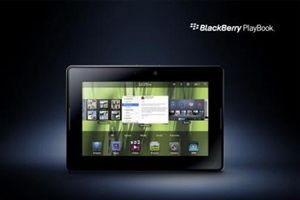SAN FRANCISCO: Research In Motion unveiled a tablet computer aimed at its core business customers, as it tries to gain a foothold in a fast-growing market dominated by Apple’s consumer-friendly iPad.
 The BlackBerry PlayBook has a seven-inch touchscreen, dual high-definition cameras and boasts support from corporate IT departments. It has WiFi and Bluetooth but needs to link with a BlackBerry smartphone to access a cellular network.
The BlackBerry PlayBook has a seven-inch touchscreen, dual high-definition cameras and boasts support from corporate IT departments. It has WiFi and Bluetooth but needs to link with a BlackBerry smartphone to access a cellular network.
RIM emphasized the PlayBook’s “uncompromised” Web browsing experience — which, unlike the iPad, supports Adobe’s widely-used Flash multimedia software — as well as the tablet’s security.
RIM expects to ship the device to corporate customers and developers in October, and to consumers starting early in 2011, meaning it will miss a crucial sales window in the holiday buying season. In the meantime, many competing tablets are expected to hit the market.
The company also did not reveal how much it would charge for the PlayBook, and pricing could be an important factor in its adoption.
Shares of RIM rose 2 percent before paring gains slightly in after-hours trade following the announcement, made at the company’s annual developers’ conference in San Francisco.
MKM Partners analyst Pablo Perez-Fernandez said he was initially skeptical about the tablet, but said key PlayBook features could help it stand apart from the iPad. “We think this was a positive surprise, they did a good job of integrating it with the handset,” said Perez-Fernandez, who has a buy rating on RIM.
The Waterloo, Ontario-based company has recently struggled to impress investors and analysts, who mostly shrugged off the August launch of its Torch smartphone, and fretted about eroding support among its core corporate clientele.
While RIM is pitching the PlayBook as the evolution of its corporate heritage, its hopes the powerful processor and media offerings lure consumers too.
“They talk enterprise but this will get bought by individuals and used for business,” IDC analyst Stephen Drake said from the floor of the presentation.
The market for tablets — touchscreen devices larger than a smartphone and smaller than a laptop — has exploded since Apple launched its iPad in April. Samsung and Dell have launched competing devices in the past two months, with others expected from Hewlett-Packard and Toshiba.
Industry analysts expect global tablet sales of 40 million to 50 million units in 2011, with the market still dominated by the iPad. RIM also launched its own mobile advertising network, following Apple’s entry into that market earlier this year. Google’s AdMob also has a major presence in mobile advertising.
Developers will receive 60 per cent of the advertising revenue, and RIM will provide analytics tools for targeting the ads effectively. PlayBook can mirror a BlackBerry phone, giving users a bigger screen to view media and edit documents, and wipes out all corporate data once the link between the two devices is broken.
The absence of a direct link to the cellular network means network carriers may be less eager to subsidise the device or promote it heavily. But corporate IT departments will likely cheer about its ability to mirror a company-issued BlackBerry without retaining that data when that link is broken.
“It’s compelling, certainly to an IT guy, if they can look at this tablet and say it’s really nothing we have to lock down,” said Kevin Burden from ABI Research.
The PlayBook weighs 400 grams (14 ounces). It will launch with a dual-core, one gigahertz processor running a QNX operating system. RIM acquired QNX less than a year ago.
RIM has yet to set an exact price for the PlayBook but says it will fall in the lower range of prices for consumer tablets already in the suddenly congested market. Apple’s iPad starts at $499.
Asked if later versions will connect to advanced 4G networks now under development, RIM co-Chief Executive Jim Balsillie said, “That’s not a question we’re answering today, but it’s not a hard one to guess at.”


